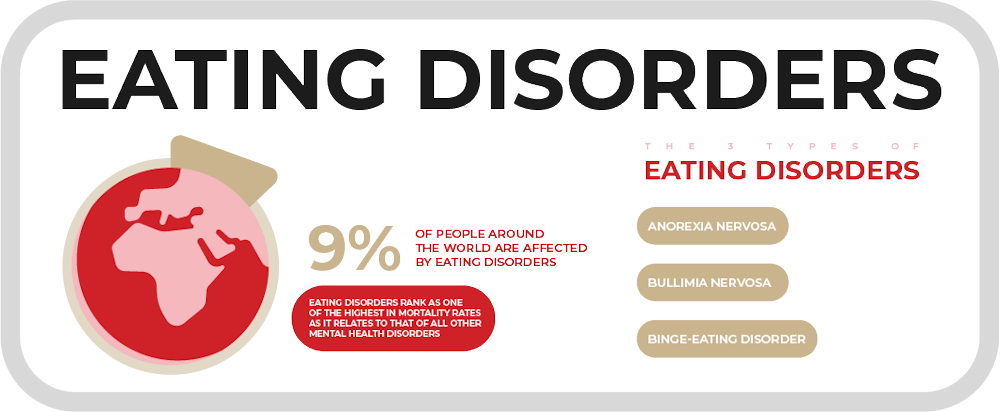Eating Disorder Treatment in Indiana
Eating disorder is a serious condition that is made even worse by the fact that very few people would want to talk about them. The National Association of Anorexia Nervosa and Associated Disorders (ANAD) reveals that there are at least 30 million Americans living with an eating disorder as of 2020. If this is not enough reason to have eating disorder programs all over the US like that offered in the eating disorder treatment in Indiana, then add these disturbing facts: at least 10 million American men will suffer from an eating disorder in their lifetime, and this condition is the third most common chronic illness among adolescent females in the country.
What is an Eating Disorder?
 Eating disorders encompass a range of psychological conditions that has or includes a pronounced unhealthy eating habit among the symptoms. These conditions often cause a distorted perception relevant to food, body weight, or body shape. As these conditions have a direct correlation with how the body receives nutrition, it is considered as being a deadly form of mental illness and requires immediate treatment.
Eating disorders encompass a range of psychological conditions that has or includes a pronounced unhealthy eating habit among the symptoms. These conditions often cause a distorted perception relevant to food, body weight, or body shape. As these conditions have a direct correlation with how the body receives nutrition, it is considered as being a deadly form of mental illness and requires immediate treatment.
The more common manifestations or primary symptoms of eating disorders include:
- Severe restriction of food
- Uncontrollable food binges
- Purging behaviors (vomiting, unneeded use of laxatives)
- Overexercising
Eating disorders are typically very serious conditions affecting physical, psychological, and social function. Further research into the condition suggests that eating disorders often co-occur with other mental health issues, including:
- Anxiety disorders
- Disorders that primarily affect mood
- Obsessive-compulsive disorder (OCD)
- Alcohol use disorder
- Substance use disorder
What are the Types of Eating Disorders?

Most people who do not understand the condition would think that an eating disorder is simply that: the inability to eat properly. While this might be a correct presumption, it is also oversimplifying the condition, as there are different types of eating disorders that have been classified by the mental health experts that study them, including:
This condition is the most well-known eating disorder and generally develops during adolescence or young adulthood. It typically affects more women than men, where the person views themself as being overweight, regardless of their true weight. In most cases, those who consider themselves as being overweight are actually already dangerously underweight. People who suffer from an eating disorder will typically constantly monitor their weight, avoid foods that they believe would contribute to their perception of being overweight, and severely restrict their calorie intake.
Symptoms of anorexia nervosa include:
- Extremely restricted eating patterns
- Severe fear of weight gain
- Persistent behavior aimed at avoiding weight gain
- Relentless pursuit of weight loss
- Inability to maintain a healthy weight
- Extremely low self-esteem tied in with weight issues
- Distorted body image preventing them from acknowledging they are seriously underweight
In many instances, people with anorexia are preoccupied with constant thoughts about food, and some may obsessively collect recipes or hoard food. This behavior suggests that the presence of obsessive-compulsive disorder (OCD) symptoms are also often present. People with anorexia may exhibit one of two common behaviors towards food: the restricting type, which involves constant avoidance of eating, and the binge eating and purging type, where the person eats massive amounts of food only to induce vomiting later.
Anorexia is immensely damaging to the body, with people who have it experiencing a decrease in bone density, infertility, and hair loss. It is not uncommon for untreated cases to result in massive organ failure due to malnutrition and death.
Similar to anorexia, bulimia tends to set in during adolescence and early adulthood, with women being more susceptible to it than men. Those afflicted with bulimia frequently eat unusually large amounts of food in a specific period of time until the person becomes painfully full. During the binge, they will feel that they cannot stop eating or control the amount of food that they are eating. To make this condition even worse, there are cases where the person binges on foods the individual would usually avoid.
People with bulimia will then attempt to purge what they ate to compensate for the calories they consumed and to relieve the sensation of being painfully full.
Purging typically includes:
- Forced vomiting
- Unreasonable fasting
- Chronic use of laxatives, diuretics, and enemas even if not needed
- Manic exercise
The symptoms of bulimia may appear to be very similar to that of the binge eating or purging subtypes of anorexia nervosa, with the main difference being people with bulimia usually maintain a relatively typical weight rather as opposed to being severely underweight in anorexia.
Symptoms of bulimia nervosa include:
- Uncontrollable chronic binge eating
- Severe purging behaviors to prevent weight gain
- Self-esteem is overly dependent on body shape and weight
- Severe fear of weight gain regardless of actual weight
- Inflamed and/or sore throat
- Swollen salivary glands
- Severely worn tooth enamel
- Prominent tooth decay
- Acid reflux
- Gut irritation
- Severe dehydration
- Hormonal disturbances associated with malnutrition
- Electrolyte imbalance
In severe cases, bulimia can also create an imbalance in levels of electrolytes, such as sodium, potassium, and calcium. This can cause a stroke or heart attack.
 Many think that eating disorders mostly result in being underweight, but there is also an aspect of this disorder that goes to the opposite spectrum of the eating behavior and causes the person to take on a dangerous amount of weight. This is manifested in binge eating, where the person will manifest some behavioral patterns similar to bulimia or anorexia where they are unable to control their eating habits.
Many think that eating disorders mostly result in being underweight, but there is also an aspect of this disorder that goes to the opposite spectrum of the eating behavior and causes the person to take on a dangerous amount of weight. This is manifested in binge eating, where the person will manifest some behavioral patterns similar to bulimia or anorexia where they are unable to control their eating habits.
People who suffer from binge eating will eat usually large amounts of food in a relatively short amount of time and feel completely unable to stop themselves during that period of eating. Unlike anorexia or bulimia, people with binge eating disorder will not consider the calories nor will they engage in purging behaviors, or excessive exercise to compensate for the excessive eating.
Symptoms of binge eating disorder include:
- Consuming large amounts of food rapidly
- Eating in secret
- Eating despite not feeling hungry
- Feeling a lack of control while they binge eat
- Feeling shame, disgust, or guilt while eating
- Obesity
The unhealthy amount of food taken will inevitably lead to severe weight gain, which in turn could increase the chances of medical complications such as heart disease, stroke, and type 2 diabetes
Pica is a bizarre eating disorder that involves eating things that are not considered food and should not be eaten, such as snow, dirt, soil, chalk, soap, paper, hair, cloth, wool, pebbles, and laundry detergent, to name just a few. This condition could occur in adults, children, and adolescents and is typically seen in individuals with conditions that affect daily functioning, including intellectual disabilities, developmental conditions such as autism spectrum disorder, and mental health conditions such as schizophrenia.
Individuals afflicted with pica are at an increased risk of poisoning, infections, stomach injuries, and nutritional deficiencies. Depending on the substances ingested, this condition could even be fatal. It should be noted, however, that pica is strictly related to a mental health condition and is not associated with ritualistic consumption done with cultural or religious traditions.
Rumination disorder is an eating disorder that involves a behavior that mimics the eating pattern associated with ruminants such as cows. Ruminants typically regurgitate a portion of the food they previously ate and chew it once more. People with this disorder likewise regurgitate the food they have previously chewed and swallowed to chew it again. They then either swallow it again or spit it out.
This rumination is observed to occur within the first 30 minutes after a meal and is believed to develop during infancy, childhood, or adulthood. In infants, this behavior comes out between 3 and 12 months of age and will often disappear on its own. Children and adults with this condition, however, will need DBT therapy to resolve it. Infants who were not able to resolve this often suffer from severe weight loss and malnutrition that could be fatal.
Adults with this disorder will typically restrict the amount of food they eat, leading to weight loss, being dangerously underweight, and potentially life-threatening malnutrition.
The term Avoidant/restrictive food intake disorder, or ARFID is a new term coined for an old disorder, replacing feeding disorder of infancy and early childhood. This is a condition previously associated with children under age 7. Individuals afflicted with this disorder experience difficulty in eating due to either a lack of interest in the act or a distaste for certain smells, tastes, colors, textures, or temperatures.
Symptoms of ARFID include:
- Avoidance or restriction of certain food items
- Eating habits (avoidance or restriction) that interfere with typical social functions
- Weight loss
- Poor development for age and height
- Malnutrition
- Nutrient deficiencies
In most cases of ARFID, the individual may need to depend on numerous food supplements to receive the nutrients that they lack. In extreme cases where the individual simply cannot eat most foods, tube feeding may be required for the body to get the needed nutrients.
First City Recovery Can Help You with Eating Disorders
There is no shame in seeking help for an eating disorder. The shame lies in allowing it to go unchecked, and eventually suffering from the serious health issues that come with it. We know it is next to impossible to talk about it, let alone deal with it, which is why our addiction and mental health treatment in Indiana have made it our business to find the most effective ways to help people with it, because getting them the care and help they need as soon as possible is utterly important. Just about 35 miles north of Indianapolis, we here at First City care enough to do what needs to be done to help you get well, all you need to do is talk to us.


MD, Psychiatrist
Dr. Vahid Osman, MD is a psychiatry specialist in Indianapolis, IN.
Dr. Osman completed a residency at Austin State Hospital. He has over 32 years of experience in Psychiatry & Behavioral Health. He is board certified by the American Board of Psychiatry and Neurology.




